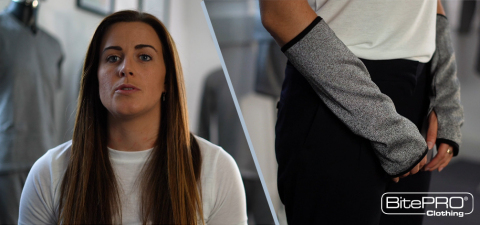Britse firma BitePRO claimt dat onderwijsprofessionals dagelijks worden gebeten door leerlingen
WETHERBY, England-(BUSINESS WIRE)- Volgens de Britse firma BitePRO lopen leraren en onderwijsprofessionals een verhoogd risico om gebeten te worden door leerlingen en kunnen de gevolgen ernstig zijn.
Menselijke beten kunnen gevaarlijker zijn dan dierlijke beten vanwege de grote hoeveelheid en soorten bacteriën en virussen in de menselijke mond. Menselijke beten die de huid beschadigen, kunnen voor ernstige besmettingen zorgen.
Volgens verschillende medische bronnen is aangetoond dat menselijke beten hepatitis B, hepatitis C, herpes simplex virus (HSV) syfilis, tuberculose, actinomycosis, tetanus en zelfs het humaan immunodeficiëntievirus (HIV) kunnen overbrengen.
British Firm BitePRO Claim Education Professionals Are Bitten By Pupils On Daily Basis
WETHERBY, England–(BUSINESS WIRE)– According to British firm BitePRO, teachers and education professionals are at increased risk of being bitten by pupils and the consequences can be severe.
This press release features multimedia. View the full release here: https://www.businesswire.com/news/home/20191015005707/en/

Kayleigh Davis, BitePRO’s Senior Consultant on the protection from human bites. (Photo: Business Wire)
Human bites can more dangerous than animal bites because of the large quantity and types of bacteria and viruses contained in the human mouth. Human bites that break the skin can become severely infected.
According to several medical sources, human bites have been shown to transmit hepatitis B, hepatitis C, herpes simplex virus (HSV) syphilis, tuberculosis, actinomycosis, tetanus and even the human immunodeficiency virus (HIV).
Robert Kaiser, CEO of BitePRO a firm specialised in bite resistant clothing states: “We are fully aware of teachers working in special educational needs schools or units for pupils with severe mental and behavioural problems who were bitten so hard, so they had to be given vaccinations against infectious diseases and viruses such as Hepatitis B. Many also required immediate surgery.”
“Regrettably, there is still a culture in some schools, particularly where pupils have severe behavioural problems, that being assaulted is all part of the job.”
Recently, teachers seem to talk openly about their daily experiences of being bitten, and their visits to hospitals. This is most certainly the case.
Brett Bigham, Oregon’s Teacher of the Year in 2014 reported to have been bitten so badly that he was sent to the hospital.
In October 2019 a Canberra public school worker was repeatedly bitten by one of her students. She was injured on a weekly basis, for six months, by a child with a mental disability. In an interview with local media she stated: “”I was bitten on the arms; I was bitten on the stomach and I was bitten on the leg. That was day one.”
The ‘News and Features from the National Education Association’ admitted or rather stated on the 20 June 2019 that many teachers, administrators, and education support professionals (ESPs) are at risk of being bitten while at work.
Educational professionals around the world are now rightly calling for greater protection from children who bite them. Human teeth breaking their skin and leading to serious injury, infections, long term trauma and require complex surgery cannot be part of their daily routine.
Many have now walked away from a profession they were once extremely passionate about, because medical experts have been able to identify that they suffer from PTSD (Post Traumatic Stress Disorder), an illness, usually associated to soldiers returning from wars, having witnessed severe levels of violence.
According to Robert Kaiser, bite resistant arm guards might not change the behaviour of violent children, or the behaviour of children diagnosed with specific mental illnesses. But there is no question about it, such type of highly protective clothing will reduce the risk of injury and infections. It will prevent immense long-term emotional distress to teachers. It will help them to continue working within a sector they are passionate about.
Kayleigh Davis, Senior Consultant at BitePRO is also keen to point out some vital legal information: “Today’s legal environment will require a risk assessment to be conducted, highlighting any realistic risk employees are being exposed to e.g. being bitten by a pupil.”
“The purpose of such is to very clearly identifying a) the precise risk, b) the potential liability and c) the implementation of effective mitigating measures. I believe that BitePRO should be considered as one of many mitigations measures you can utilise and implement to reduce a realistic risk faced by today’s educational professionals.”
“Failing to do so can ultimately result in liability claims and legal action being taken against your organisation by either an injured employee or indeed an overseeing government body.”
The Portland Tribune reported on 01 February 2019 that eight educational assistants are suing Portland Public Schools and several administrators for $3.6 million alleging the special needs students they were supposed to assist frequently assaulted them by biting and scratching etc. The lawsuit accused the district partly of negligence. The lawsuit claimed the district and administrators did not sufficiently protect the educational assistants or students.
The fact of the matter is a school and any other educational facility is required to provide a safe and healthy workplace: It is not optional. It is the law.
For any product related questions, please email info@bite-pro.com.
### END
About BitePRO:
The BitePRO brand is part of PPSS Group’s global operation. PPSS Group is specialised in the development, manufacturing and supply of high-performance personal protective equipment, offering unrivalled protection from edged weapons, blunt force trauma and even human bites. Please follow BitePRO on social media: Facebook, LinkedIn, Twitter and Instagram.
View source version on businesswire.com: https://www.businesswire.com/news/home/20191015005707/en/
Contacts
Media Contact:
Ryan Vickers – Chief Development Officer (CDO)

